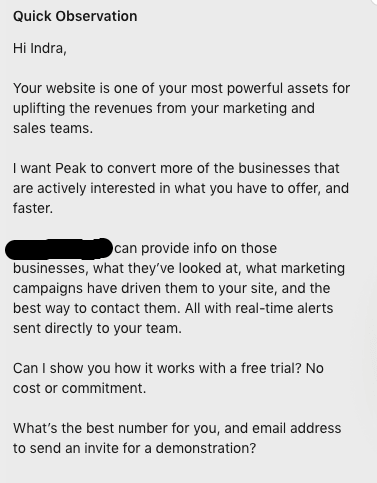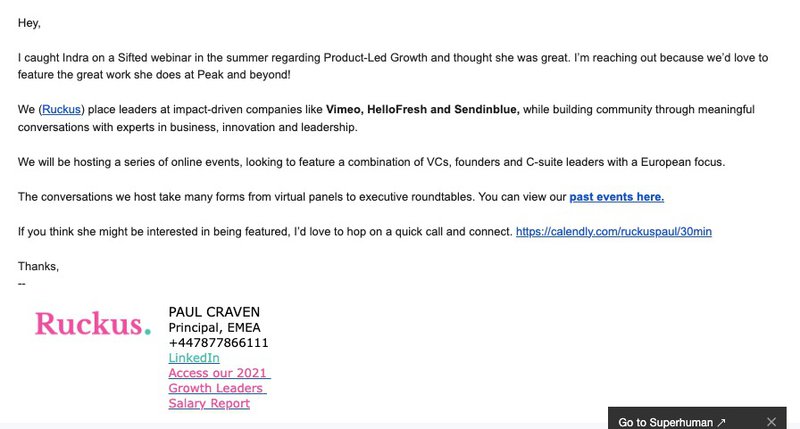Cold reachouts might sound a bit scary or even bothersome to some people. After all, reaching out to a stranger with a request or an idea can be nerve-wracking, especially when you’re unsure how they’ll react. But, trust me, cold reach-out is a game-changer for growing your knowledge and expanding your network. In today’s cutthroat world, grabbing every opportunity to learn and connect is essential; cold reach-out is one way to make that happen.
In this blog post, we’ll explore why cold emailing matters, share some valuable tips on crafting killer cold emails and elaborate on how it can fuel personal and professional growth.
Since a young age, one of my secret weapons has been my fearlessness when reaching out to strangers when needed. For instance, I landed my first job as a developer at SunGard Front Arena by cold emailing one of the engineering managers and asking for an opportunity to do my degree thesis there. I wanted to do my thesis at a company, not in academia (unlike many of my peers at Uni). I knew I wanted a career in the workforce, not academia, and doing my thesis at a company would give me an edge since I didn’t have any non-academic contacts back then.
This happened during the 2008 financial crisis when getting a job or even a thesis opportunity at a company was challenging. However, my cold email managed to grab the attention of the engineering manager. Though he initially declined my request, he offered to meet for coffee. That coffee meeting turned the tables, and he ended up offering me a paid thesis opportunity at SunGard Front Arena—all thanks to that first cold email.
Today, it’s even simpler to get a hold of someone than it was back then. We are surrounded by tools to help us connect (and learn), such as Twitter, Linkedin, Discord, and Melon.
Why Cold Reach-Out is a Big Deal
Expanding Your Knowledge Base and Network
Cold reach-outs can be like striking gold regarding information, expertise, and insights. By reaching out to experts in your field, you can tap into a wealth of knowledge that’s not easily accessible otherwise. This can lead to fresh ideas, perspectives, and growth opportunities – and save you time. For example, if you’re a software engineer, you might reach out to someone who’s a pro in a programming language or framework you’re trying to learn. They could offer resources or insights you might not find on Youtube or a simple Google search. When I was a quant, I used cold emailing when learning a new programming language, Apama’s MonitorScipt. It is an event-based programming language, and no information, at that time, was available through Google (this was before Stack Overflow became what it is today). On the trading floor where I was working, no one else had knowledge of MonitorScript or even programming. I had no choice but to cold email people I found online to find a mentor with deep knowledge I could tap into. Thank God for cold emailing.
As a VC, cold reach-outs are part of my daily job. I learn so much from my peers in the industry and also from entrepreneurs and other thought leaders. Many I’ve connected with through cold outreach. By taking the initiative to reach out, you show your genuine interest in their work, (hopefully) leaving a lasting impression and paving the way for future interactions. Plus, dealing with rejection or non-responses helps you build resilience and adaptability, which are crucial for success in any field. This is something (some) founders (unfortunately) experience when fundraising. And it also applies to VCs.
A solid professional network can open up a world of job opportunities, partnerships, and collaborations. Cold reach-out is an active way to grow your network by connecting with people who share your interests or work in your industry. These connections can blossom into valuable relationships, mentorships, and even friendships.
Tips for Crafting Killer Cold Reach-outs
Do Your Homework
Before hitting the send button on a cold reach-out, spend some time researching the person you’re contacting. Get to know their work, background, and interests. This helps you craft a personalized and relevant note and importantly, it shows your genuine interest in their expertise. It doesn’t have to be hours spent, but at least make sure that you know who you are reaching out to and why. I often receive messages that clearly show that the sender has written a generic message that has probably been sent out to many people. It makes me less eager to respond. Here is an example of such an email:

The sender has obviously sent a standardized note needing more understanding of what I do. As a VC, we don’t have a marketing and sales team. The founders we partner with often do, but we don’t. I pressed ‘Archive’ and moved on to the next one.
I guess that the next natural question to me would be: Do you always reply to cold reachouts? My honest answer is: Often, it depends on the nature of the reach-out. I usually reply, but I choose carefully to whom I give my time.
Here is an example of a (cold) outreach from Paul Craven at Ruckus. Not only did I reply but I also joined the podcast, which I very much enjoyed:

I liked that Paul had done his research, seen my previous work, and saw a fit with Ruckus. He also briefly describes what they do and a clear next step.
Keep It Clear and Concise
As a receiver of many cold reach-outs, I believe it’s key to aim to make your message short and sweet. Clearly state your purpose and explain why you’re contacting this person. Don’t forget that the attention span of GenZ is around 8 seconds, and for Millenials, 12 seconds (you can read more about attention span here).
Offer Something Valuable
In your message, try to provide something valuable to the recipient. It could be a compliment on their work, a helpful article or resource, or a collaboration opportunity. By offering value, you increase your chances of getting a positive response. If you don’t feel you have anything valuable, a lunch, coffee, and your genuine interest might make up for it.
Cold outreach is a powerful tool for expanding your knowledge base and growing your network. By approaching it with a strategic and thoughtful mindset, you can unlock new opportunities for learning and connection. It is also an opportunity to diversify your network (you can read more about that here). So, don’t shy away from cold reach-out—embrace it as a powerful personal and professional growth method. And the worst case, if you don’t receive an answer, you can reach out to them again next week!
